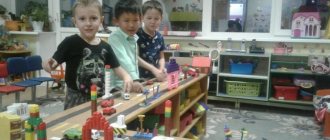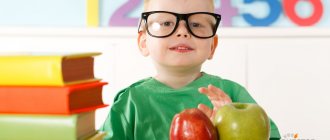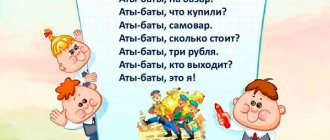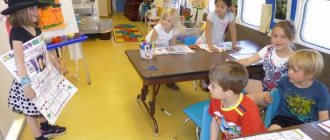taken from botan.cc
Russian folk tales have always amazed us with their simplicity and, at the same time, deep meaning. Each of them carries something special, something that makes you think and learn useful lessons. Remember how in childhood each of us was read folk tales. Children love such works very much, so performances based on them are often staged in kindergartens. Today we offer you scripts for two Russian folk tales - “Kolobok” and “Turnip”. The second tale is slightly changed to add a bit of originality and intrigue the audience.
“Let’s give children a fairy tale”: Theater in kindergarten
- December 30, 2014
Competition “My Pedagogical Initiative - 2014”
Nomination “Methodological work in preschool educational institutions”
I invite you to the wonderful world of children's theater.
Theater is bright positive emotions, thanks to which we have the opportunity to manage the formation of a child’s spiritual needs, enrich and develop his personality.
The main goal of my work with children is the development of the creative personality of a preschool child. I found the only correct and effective, interesting way for myself and the children to realize this goal - organizing theatrical activities in kindergarten. I have been working in this direction for several years now. During this time, my students and I, with the help of colleagues and parents, together we built our children's theater.
The building of our theater is firmly based on the basic principles:
- the principle of visibility and accessibility . This principle is based on the fact that theatrical activity is close and understandable to the child, as it is inextricably linked with play;
- the principle of freedom and independence , which allows the child to choose his own role in the action and determine his attitude towards this role;
- the principle of combination , which allows the use of collective and individual forms and methods of work, which makes it possible to develop the child’s creative personality in a variety of activities;
- the principle of systematicity and consistency , which is implemented in the fact that classes are held within the framework of a theater studio.
In the windows of our theater you see the cheerful faces of the children, they seem to invite us to enter. Let's climb these steps, enter the hospitable, wide open doors and plunge into the magical world of theatrical activities in kindergarten.
Classes with children in our theater are based on the use of theatrical pedagogy, adapted for children, with increased play moments. Work is carried out in the following areas:
- culture and technique of speech;
- rhythmoplasty;
- fundamentals of theatrical culture;
- work on the play.
Each direction solves a group of problems.
Culture and technique of speech. Not only for actors - for all people it is necessary to have intelligible, coherent, correct, competent and beautiful speech. In theater classes, children's speech apparatus is improved, speech breathing and correct articulation, diction, and speech development are developed. We use different materials: articulatory exercises for the lips and tongue, tongue twisters, tongue twisters and poetry, breathing and voice exercises, and intonation expressiveness.
Rhythmoplasty. This section includes complex rhythmic, musical, plastic games and exercises designed to develop coordination of movements, teach how to create images of animals using plastic arts, and help children gain a sense of harmony between their body and the world around them.
Fundamentals of theatrical culture. Theater is not only a performance, but also a whole world of new words and concepts that are not used in everyday life. This is the “stage”, “curtain”, “backstage”. Acquaintance with many more amazing words and concepts awaits those who wish to look behind the scenes of the theater.
Work on the play is based on original plays based on Russian folk tales.
The fairy tale also pleases us, adults, with optimism, kindness, love for all living things, and compassion for the weak. A fairy tale educates morality, because through a fairy tale, children first come into contact with the understanding of good and evil, hard work and laziness, love and hatred and other moral concepts. Children's favorite fairy tales “Turnip”, “Kolobok”, “Teremok” are easily dramatized.
In the older group, children can already create full-fledged performances based on the fairy tale. A child, entering a fairy tale, gets the role of one of the heroes, thereby getting closer to the culture of his people, to our value system, to the Russian mentality. And with what pleasure children change clothes, creating a new image! The composition is created by children mainly for child viewers. Therefore, there is always a special atmosphere of trust in everything that happens on stage in the hall. It unites both performers and spectators in a single creative impulse.
Theater activities require children to be systematic in their work, hard work, determination, and perseverance in achieving goals, and this leads to the development of strong-willed personality traits, which is a good basis not only for subsequent studies at school, but also for success in later life.
Just as it is impossible to build a large and beautiful building alone, it is also impossible to create a theater alone. The enthusiastic, creative workers of our kindergarten are happy to play different roles in entertainment and leisure, theatrical activities, at holidays, and, of course, involve children in theatrical activities. During this time, we have accumulated considerable experience, and the costume department has been replenished with bright, beautiful costumes.
The theater combines all types of art, which makes it possible to talk with children not only about its history, but also about painting, architecture, the history of costume and decorative arts. I am convinced that only in the process of theatrical activity is the comprehensive development of a child’s creative personality possible. Theater education helps to identify and prepare the most gifted and capable children. They may not become great actors, but they will certainly grow up to be bright, talented, creative individuals.
Our children develop new skills and abilities in the process of theatrical activity:
- they can pronounce tongue twisters at different tempos;
- are able to act in concert;
- know how to relieve tension from individual muscle groups;
- know how to build a simple dialogue;
- know several articulation exercises;
- are able to pronounce a phrase with different intonations.
The process of creating a fairy tale captivates the children so much that they know each other’s words, sing songs from the play both on a walk and in the evening, putting books on the table and imitating playing the piano, and even at home. In the diagram you see how the number of children with a high level of knowledge and skills in all sections of theater activities has increased compared to the beginning of the school year.
There are different paths leading to the building of our children's theater. The path for communication with parents is lined with pink pebbles. They present all types of work with parents of pupils:
- individual conversations;
- reports;
- open days;
- open viewings of performances, holidays, fairy tales, games;
- joint work on the preparation of theatrical performances.
This path initially had one direction - from the children's theater to the parents. But gradually, parents began to understand the need for theatrical work in kindergarten, saw the children’s development and interest in such activities, and began to actively help us in preparing performances, their design, and selection of attributes.
Another path is a connection with the school and the House of Children's Creativity. We are largely connected with the school by the fact that the children of teachers from MBOU Losevskaya Secondary School No. 1 attend the group; they are also enthusiastic people and open to helping us. From DDT, we have a theater studio “Buratino” in our kindergarten.
Green arrows show the creative growth of the children's team. This is our road to the future. We already have experience in showing performances for children of other groups in our kindergarten, performing for parents, and staging performances at regional seminars and methodological associations, I think we are quite capable.
Theater activities in kindergarten help us, adults, not only to embody our ideas and demonstrate our talents, but also to remain, in a sense, children. And it gives our students the joy of communicating with a fairy tale, emotional pleasure and unforgettable impressions for a lifetime!
Appendix 1: Culture and technique of speech
Appendix 2: Rhythmoplasty
Author: Nagornaya Maria Dmitrievna, teacher of the MK preschool educational institution Losevsky kindergarten No. 1, Pavlovsk district, Voronezh region.
A theatrical production for children of the senior group “Whose cones are in the forest?”
PERFORMANCE “Whose cones are in the forest?
Characters:
• wolf • little fox • hare • baby squirrel • hedgehog • little frog • crow • mole Design of the performance (scenery) :
• Trees • Cones • Hut • Stump • Mushrooms • Baskets • Cranberry bushes
Voice acting of the play:
sounds of the forest, birdsong.
/A wolf appears. He is walking through the forest. A little fox is mincing nearby. Author:
In one protected forest there lived a wolf.
One day he walked around the forest with his friend and reasoned. Wolf:
Whose cones are in the forest... Whose cones are in the forest?
Whose cones are in the forest?! Who is the strongest here? I!! So everything here is mine. So? Little Fox:
No, not like that!
Wolf:
What?!
/The little fox whispers in his ear/ Wolf:
Ah...We’ll have to restore order, otherwise you’ll be wondering who’s got the cones in the forest!
Everything here is mine! /puts up signs with the inscriptions “Mine”, “Mine”/. Wolf:
Wow, I'm tired!
Well, I went to rest, and you keep order. Little Fox:
Yeah, it will be done, boss!
Wolf:
Here, have a lollipop so you don’t fall asleep!
(gives a lollipop)
Oh-oh-oh!
How I still want to sleep! /The little fox sits on a stump, begins to read the newspaper and falls asleep, covering himself with the newspaper. A hedgehog, a squirrel, a hare, and a magpie appear. They sing a song. Sound: cheerful children's music.
We walk through the forest together and sing a loud song.
It's him, it's you, it's me. Even the sun is brighter, even the sky is bluer, if you have friends next to you. The little frog covers himself with his big hat. Animals mistake it for a mushroom. All:
Oh, what!
(everyone jumps after the frog, he jumps away) Little Frog:
Eh, you mushroom pickers.
That's where the real mushrooms are hiding. Everyone (turn and read)
: Mine, mine.
Squirrel:
That's the news.
Whose mushrooms, cones, trees, flowers are these? Crow, you fly everywhere, you know everything? Maybe you heard who was giving orders in the forest? Crow:
Karr-karr...I can’t imagine who is doing such a disgraceful thing.
This is indecent, my old grandmother crow taught me: you shouldn’t be greedy, there are enough mushrooms and berries in the forest for everyone. Little Squirrel:
What are we going to do, how do we find out who was in charge in the forest?
/Little fox wakes up/ Little fox:
Hey, small fry, get out of here.
Alive! All:
Why are you giving orders?
Guys, is this his doing? Little Fox:
Well, wait, now you’ll dance with me.
Hare:
Let's ask the mole, he's been sitting in his hole for a long time, maybe he heard what was happening in the forest.
All:
Sorry, dear mole.
Could you tell us whose business this is? /The mole comes out of his hole with a magnifying glass. Explores the area. Sound: music from the film “The Adventures of Sherlock Holmes and Dr. Watson” is playing / Mole:
Well, well, well, I’ll take a look now with my magnifying glass.
I think we need an encyclopedia to be completely sure. (hides in a hole) Crow:
How smart he is.
Encyclopedia is a beautiful word. What is this? Belchonok:
This is such a very smart book.
You can find out everything there. Mole (leafing through the encyclopedia)
: So, insects.
No, that's not it. Fish. No, that's not it. Birds. No, that's not it. And here, here, here. All:
Wolf…..
Mole:
Exactly, he’s the one.
(reads)
Predatory animal.
Ravenous appetite. Wolf law. Nowhere is it indicated that mushrooms can be wolf mushrooms. That's it, collect it calmly. Hare:
Or maybe we won’t?
All:
Nonsense, in the forest everything is common.
(Sound: a cheerful song of friends. Everyone is picking mushrooms, a wolf and a fox cub appear) Fox cub:
Look, boss, I told you, your mushrooms and berries are being picked.
Wolf:
Who allowed it without asking?
What have you forgotten how to read? it is written: “Mine” (turns over the baskets) Little Fox:
Yeah, we got scared, we got caught, my dears!
Wolf (to the frog)
: Why did you take my cranberries?
Well, put it back in its place. Little Frog:
How often do you eat cranberries?
Wolf:
What do you care?
A-a-apchhi (sneezes) Little Fox:
Be healthy, boss!
Wolf:
What did you get?
Ha ha ha ha. Now you will know whose mushrooms are in the forest... Little Fox:
And berries!
/The wolf sneezes and leaves. The little fox is hiding behind a tree/. Sound: sad melody. All the animals lower their heads and cry. Hedgehog (turns his back, there are a lot of mushrooms on it):
Don’t worry about anything, I have enough here for everyone.
Mole:
Let's dry the mushrooms for the winter.
Little squirrel:
That's right, I always hide mushrooms in a hollow for the winter.
I make 5 or 6 closets. Hare:
Then it’s more fun, friends, let’s get to work.
/Sound: cheerful children's music.
Everyone sings the song/. We walk through the forest together and sing a loud song.
It's him, it's you, it's me. Even the sun is brighter, even the sky is bluer, if you have friends next to you. Little Fox:
And they decided to dry your mushrooms, look!
Wolf:
Yes, yes.
They took my mushrooms after all. Hare:
They are about-about-common.
They are common! Wolf:
What?
Little Fox:
And they took your cones too, what impudence.
Wolf:
Ugh.
Come on, give me back my cones immediately. Little squirrel:
Oh, these are your cones?!
Take it, we don't mind. /Sound: rhythmic melody. They begin to throw cones at the wolf and the little fox. The wolf and the little fox are running away/. Little Frog:
And no one will take them away from you.
/Everyone runs away from the stage. A wolf appears/ Wolf:
Wow, I barely got my paws off.
Why do I need all this? Mole:
I personally think that you are behaving too brazenly.
Wolf:
What is this “brazen”?
Mole:
Just a minute
(takes out a dictionary and reads).
Insolent behavior.
Insolent look. Arrogant - shameless. In general, you have no shame or conscience. Wolf:
Oh, what a headache.
All the cones are mine, my mushrooms, my berries. Why do I need them if I have no one to share them with? Little Fox:
And there they are.
Wolf:
You again, sneak.
Leave me alone. Little Fox:
But, boss, these are your cones, your mushrooms.
Wolf:
Mine, you say.
No, let them be common. /The wolf leaves, the little fox is left alone/. Little Fox:
I don’t understand anything. Can someone explain to me what's going on here? Sound: performance of the final song about Friendship.
Publication address:
Scenario of the fairy tale "Kolobok"
Characters:
Kolobok Grandma Grandfather Wolf Fox Hare Bear Storyteller
Act 1
On the stage there is a wooden house, in the background there is a forest. Grandfather and grandmother are sitting near the house.
Narrator: Once upon a time there lived a grandfather and grandmother. They didn’t grieve, but lived modestly. Grandfather wanted to eat, and he told his little wife.
Grandfather: Grandma, and grandma. Prepare something to eat, it's almost lunchtime. You should bake a bun.
Grandma: How can I bake it for you if there is no flour in the house?
Grandfather: Scratch the bottom of the barrel, look better. Look, it looks like a small bun.
Grandma gets up and goes into the house.
Turnip: Grandma started collecting flour from everywhere, and ended up collecting a couple of handfuls. I kneaded the dough and got a bun. The baked bun came out beautifully and smelled delicious. The grandmother put it on the windowsill to cool down. And the bun took it and jumped into the street!
Act 2
Kolobok appears on the stage, skips along the path and hums.
Kolobok: They scraped me up and baked me in a hot oven. I left my grandfather and left my grandmother!
The Hare comes out to meet Kolobok.
Hare: Mmm, what a fragrant bun friend! I will eat you!
Kolobok: Stop, oblique! Do you want me to sing you a song? They scraped me up and baked me in a hot oven. I left my grandfather and left my grandmother! And I’ll leave you, Hare!
Narrator: And Kolobok rolled further along the path past the Hare.
Kolobok runs further, and the Bear comes out to meet him.
Bear: Chubby little bun! I will eat you!
Kolobok: Stop, clubfoot! Do you want me to sing you a song? They scraped me up and baked me in a hot oven. I left my grandfather and left my grandmother! And I’ll leave you, Bear!
Narrator: And Kolobok rolled further along the path past the Bear.
Kolobok runs further, and the Wolf comes out to meet him.
Wolf: Ruddy barrel, delicious barrel! I will eat you!
Kolobok: Stop, gray one! Do you want me to sing you a song? They scraped me up and baked me in a hot oven. I left my grandfather and left my grandmother! And I will leave you, gray Wolf!
Narrator: And Kolobok rolled further along the path past the Wolf.
Kolobok runs further, and the Fox comes out to meet him.
Fox: Who is this fragrant, so tasty? I will eat you!
Kolobok: They scraped me up and baked me in a hot oven. I left my grandfather and left my grandmother! And I left the sideways Hare, and I left the clubfooted Bear, and I left the gray Wolf, and I left you, red Fox!
Fox: Little Kolobok, my friend, I’m old, I can’t hear well, come closer and sing your wonderful song again, I really want to listen to it.
Narrator: The naive Kolobok rolled closer, delighted that someone liked his song so much.
Kolobok: They scraped me up, baked me in a hot oven...
Narrator: And the cunning Fox took it and ate it! And the moral here is: don’t trust strangers and don’t be boastful!






